
<— Read Chapter 4: Family Aspects of a Nomadic LifestyleRead Chapter 6: Pets Can Be Nomadic Travelers Too! –>
One concern we’ll hear from more eco-aware folks is that traveling full time would inevitably have too high of an environmental impact for them to leave home without bringing along a hefty burden of eco-guilt.
This guilt is understandable — a life in motion consumes resources, and we certainly do not dispute the environmental impact of travel.
But we have found that being green(er) while traveling is actually very achievable. And indeed, it is often possible to have less of an environmental impact living nomadically than by living a more typical American lifestyle (which generally includes travel for work and pleasure anyway).
Each of us needs to find our own balance that combines exploring the world with preserving it. And if you stay conscious to your consumption, you don’t have to compromise your wanderlust for your desire to live a sustainable life.
Choose Greener Forms of Travel / Travel Slower
Every mode of transportation has a different footprint on the environment. Air travel is generally considered the dirtiest mode of transportation and walking/biking the cleanest. The energy consumed in getting from place-to-place is one of the most substantial impacts a full-time traveler has.
One solution? Slow down!
Spend more time in one location and less time in actual transit. Stay in places long enough to get a feel for them, and immerse yourself in the communities you visit.
 If you are keeping a relaxed enough pace, you can actually log a lot fewer miles than a typical suburb-to-city commuter will over the course of a year. And since you are not repeating the same route day after day, you will see SO much more of the world too!
If you are keeping a relaxed enough pace, you can actually log a lot fewer miles than a typical suburb-to-city commuter will over the course of a year. And since you are not repeating the same route day after day, you will see SO much more of the world too!
Also consider greener ways you can get to where you want to be. For example — what about taking a slower route via rail or sailing, instead of flying? Or you can do like some nomads have and use human power to bike, walk or run.
Make the journey part of your destination and you’ll add value to your travel experience and decrease your impact while doing so.
For those who’s form of travel is physically moving their mobile house (RV or boat), find ways to green them as much as possible. They range greatly in energy needs and construction – research and select based on your priorities.
Integrating in alternative energy sources, like solar and wind – not only reduce your environmental impact, they can increase the range of options for places to visit. Some diesel RVs can even be converted to be powered by waste vegetable oil (WVO), which lowers environmental impact and reduces costs dramatically. We’ve met full-timers who have gone for years without paying for fuel!
Reduce your Destination Impact
Once you’ve arrived to a place you’re planning to stay for a bit, find ways to reduce your impact and respect the local ecosystem while learning about your new surroundings.
- Be there long enough to contribute to the community — either financially to the local economy and/or through volunteerism.
- Find ways to support local businesses.
- Eat foods grown and made locally. Eating locally reduces the impact to the earth for foods shipped halfway around the planet to catch up to you — and it helps you really experience the locale.
- Seek out greener options for your lodging.
- Use public transit, walk or bike instead of driving around town whenever possible.
- Be aware of your impact.
A full time traveler has a unique opportunity to have their visits to places be contributive overall, as well as gaining unique perspectives on our planet.
RVing and Being Green
We’re often asked to justify our full time RVing lifestyle, as it’s perceived by some as being a very environmentally dirty way to live. This often begins with criticism of the lower fuel efficiency that most RVs have.
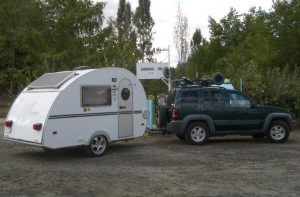 For the record, being green is important to us, but it is not the primary goal of our journeys. There are many others striving for much greener RVing lifestyles than we manage.
For the record, being green is important to us, but it is not the primary goal of our journeys. There are many others striving for much greener RVing lifestyles than we manage.
But with just a little care, even a less conservation obsessed traveler can actually end up living a greener life than most living a more typical fixed lifestyle.
As an example – here is what we have learned carefully watching our fuel, water, and power consumption over our years on the road.
Fuel Consumption
This is where RVing gets its dirty reputation. Mobile homes burn fuel. And lots of it.
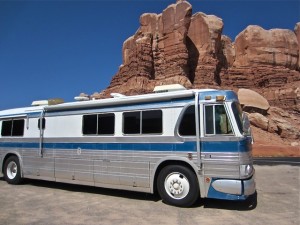 Our bus, on a good day, gets 7 – 7.5 mile per gallon burning diesel fuel. Many larger motorhomes get fuel economy in this range (typical seems to be anywhere between 5 – 9 mpg), and some other optimized configurations can get into the teens. The most fuel efficient small diesel RV’s (usually based upon a Sprinter chassis) can occasionally manage 20+ mpg, but that sort of efficiency is exceedingly rare.
Our bus, on a good day, gets 7 – 7.5 mile per gallon burning diesel fuel. Many larger motorhomes get fuel economy in this range (typical seems to be anywhere between 5 – 9 mpg), and some other optimized configurations can get into the teens. The most fuel efficient small diesel RV’s (usually based upon a Sprinter chassis) can occasionally manage 20+ mpg, but that sort of efficiency is exceedingly rare.
When we were towing our homes, our Truck/Oliver combination was 12-13 mpg (gas). And our Jeep/T@B combination was 16-18 mpg (diesel).
Compared to us previously living ‘at home’ and each driving around a high fuel economy Prius – yup, those seem like pretty bad numbers.
But here’s another perspective – our annual fuel consumption over the years:
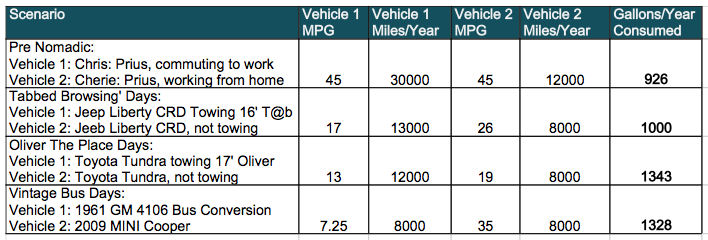
Living on the road changed our lifestyle. Driving our RVs around has been not that much more fuel consumption than driving two Prii (Priuses).
Pre-Nomadic
When we were stationary, Chris had an apartment in San Francisco and commuted 45 miles each way, daily. And that’s not including his ‘fun’ non-commute miles during his off time. Annually, he easily put 30,000 miles on his Prius.
Cherie worked from home and didn’t have a commute, but most of her miles on her Prius were on weekends to go visit friends or longer road trips. She would put on what is considered typical mileage of 12,000 miles per year.
Combined, we probably consumed about 926 gallons of fuel a year.
But keep in mind.. we each had a Prius getting on average 45 mpg. Had we been driving more typical American high efficiency cars getting, say 28 mpg, we’d would have been burning 1500 gallons a year.
RV Nomadic Years
Now with both of us working from home remotely while on the road – all of our miles are either in the RV or touring around where we’re visiting or running errands. And we have complete control over those miles! No more required commutes. We pick the pace of our travels (which has slowed down over the years). Some months we may be parked still and just doing some minor local driving. Others, we may be making a cross country transition.
Obviously, this is just one example based on our unique circumstances – but hopefully it shows you some perspective. Living in a micro small space like the T@b was actually pretty much on par with our previous commuter fuel consumption. And at worst, our bus has made us 30% less green from a fuel consumption viewpoint… than driving our Prii around. If we had previously driven more average vehicles, we’d be ahead.
But here’s the biggie – WE’RE MOVING OUR ENTIRE HOUSE. And that, to us, is a significant and important point.
Water Usage
Ok, now here’s where RVing will pull ahead for most people.
I will argue that just about any RVer will use less water than they would in a regular fixed home.
Why? Simple.
All of our water & sewer is handled by tanks – that we have to monitor and fill/dump.
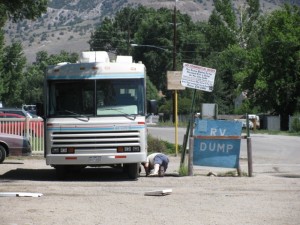 RVs generally have a fresh water tank for holding clean water for cooking, cleaning and perhaps drinking. They then have holding tanks for used water (grey) and toilet sewage (black). Because RVs have limited space and weight capacity, those tanks are limited in size. And it is that size limitation that affords RVers a green card on water usage.
RVs generally have a fresh water tank for holding clean water for cooking, cleaning and perhaps drinking. They then have holding tanks for used water (grey) and toilet sewage (black). Because RVs have limited space and weight capacity, those tanks are limited in size. And it is that size limitation that affords RVers a green card on water usage.
Regardless if we’re trying to be eco or not, filling and dumping tanks is an annoying (even icky) chore. Even while parked at a site with full sewer hook-ups, the tanks have to be dumped routinely (just leaving them open is asking for trouble). Depending on the size of the tanks and water usage, that can be every few days to every couple of weeks.
This awareness that every drop of water that comes out of the faucet goes into your holding tanks, that you will then have to dump – just simply makes most of us use less water. When you can just turn on a water faucet in a traditional home without worrying about running out or having to find a way to dispose of the dirty water, it’s very easy to lose touch with how much you’re using. Even if you look at your water bill monthly and see how much is used in a month, it’s really hard to quantify just what that means because you’re not physically handling all of the actual wet stuff.
Looking back at my average water bills for my house in Florida before I hit the road, we were using about 1000 gallons a month PER PERSON. This seems incredibly wasteful to me now.
In our bus, even if we’re being totally glutinous with our water usage, it’s rare of us to need to dump our 100 gallon tank even weekly. At most, we are using 400 gallons a month of water – or 200 gallons per person. Ok, sure – we’re not doing laundry at home anymore. So let’s add another another rough guess of 100 gallons a month for the 3-5 loads a month we do.. and call it 250 gallons a month, per person. Max.
Even not thinking about water conservation in our bus, we use 1/4 the water we did previously in our fixed based home.
Now, get us off-grid and away from easy access to fresh water and dumping, and we can revert to our ultra conservative water usage methods (we could make our Oliver’s 38.5 gallons last 2+ weeks at a time). In those cases, we can easily bring our water consumption down to less than 100 gallons per person.
You can read more in our full report on how we conserve water.
Power Usage
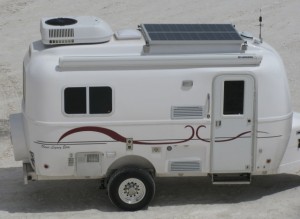 Living off battery power for any extended period of time will make you VERY aware of your power consumption. When RVing, unless you are living pole-to-pole, you’ll probably have some periods of time when you want to be away from shore power. Whether it’s overnighting in commercial parking lots while on the move, or staying an extended period of time boondocking in scenic locations.
Living off battery power for any extended period of time will make you VERY aware of your power consumption. When RVing, unless you are living pole-to-pole, you’ll probably have some periods of time when you want to be away from shore power. Whether it’s overnighting in commercial parking lots while on the move, or staying an extended period of time boondocking in scenic locations.
RVers who spend time off the grid tend to also invest in energy efficient modifications – such as LED lighting. We do this not to save money on our electricity bills, but rather to extend the range of our batteries.
Before hitting the road, I really had no concept of how how much energy I was actually using. But now after years of living off of solar filled battery banks, monitoring our usage is just a part of life.
When I flip on a LED light, or power on my laptop, thanks to our battery monitoring system, I know exactly how much energy I’m depleting from our battery bank. Being that aware can mean the difference between being able to stay in an awesome off-grid location another night, or needing to seek a replenishment soon.
Other Advantages
 There are some other edges that RVers and boaters have that tend to also mean a lower environmental impact.
There are some other edges that RVers and boaters have that tend to also mean a lower environmental impact.
- We have a very limited amount of space – so we tend to buy less stuff.
- Mobile dwellers have the option of following the weather, thus reducing energy use to heat or cool their homes while at their destination. And even when we do need to heat or cool, our space is so much smaller to regulate – resulting in a much lower overall energy consumption.
- We’re often visiting beautiful places and are inspired to do our part to keep them that way.
- Our homes take less resources to construct and maintain.
<— Read Chapter 4: Family Aspects of a Nomadic LifestyleRead Chapter 6: Pets Can Be Nomadic Travelers Too! –>
Resources:
Go Green Travel Green – Offers tips for the eco-conscious traveler.
Cheap Green RV Living – A sibling site of the Cheap RV Living community focused on greener RVing.
Green Tortoise – Want to leave the driving and planning to others? Green Tortoise offers socially conscious travel adventures in their awesome sleeper buses
What happened to the eBook version of this series?
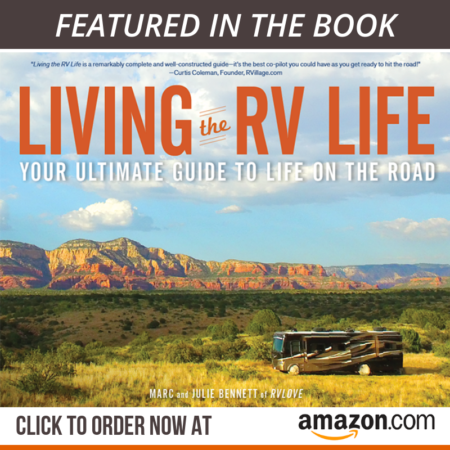
We used to offer an eBook version of this content on a ‘Pay as you Wish’ basis. That book got so out of date and we have no time to keep it updated – so we took it down.
We do our best to upkeep the segments in this blog series, but realistically can’t see republishing the book edition.
In November 2018, RV Love released their brand new (professionally published) book – Living the RV Life. It goes over a lot of similar content to this series (and more) on RVing. We highly recommend picking up a copy!
You’re of course welcome to browse the No Excuses: Go Nomadic series online for more of our tips & tricks on the logistics of nomadic travel.
If you do appreciate this series or the content on our blog, we always LOVE hearing your appreciation – leave a comment, leave a tip (link at bottom of every page) and/or share this post. Thank you!

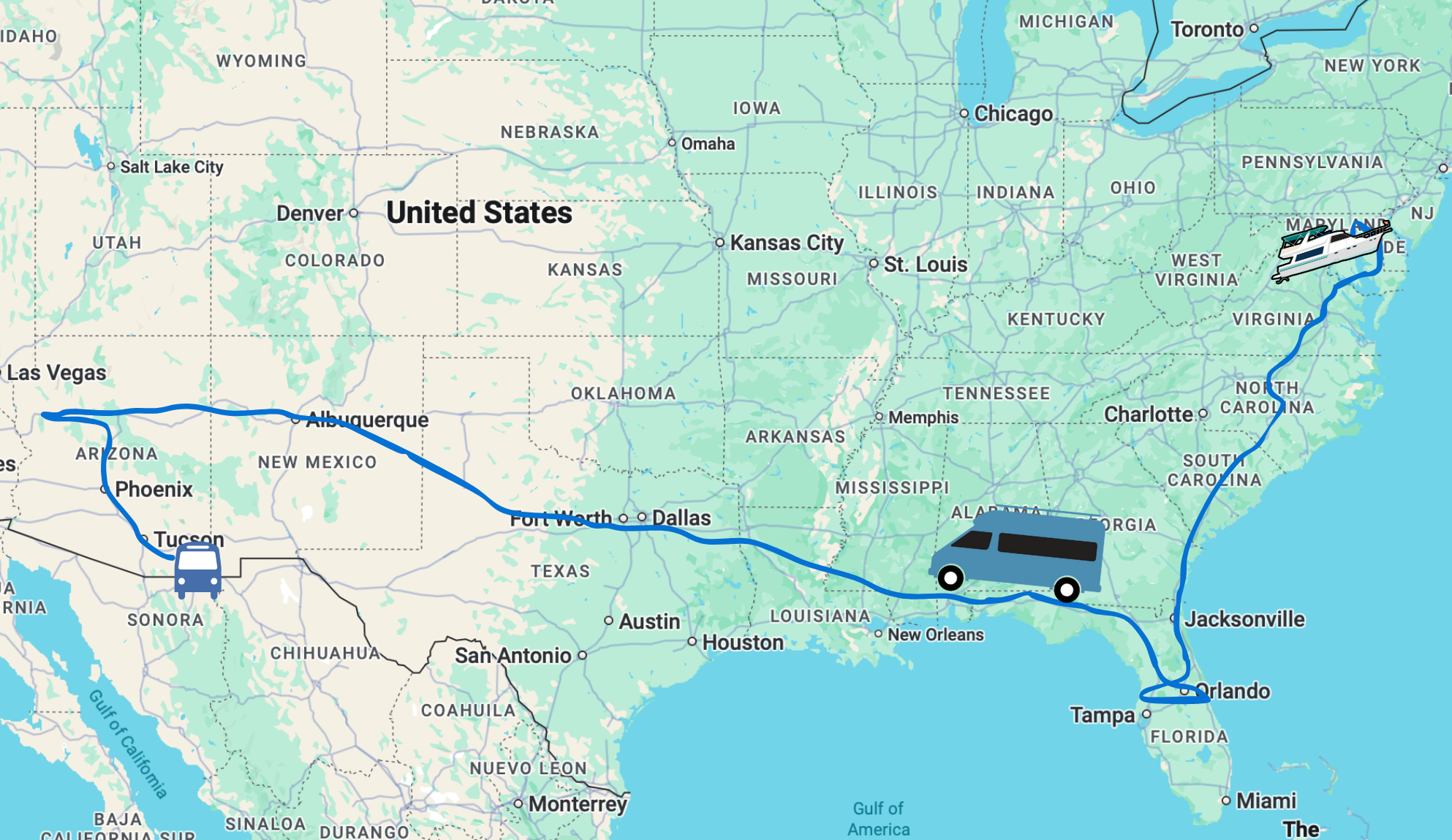
I’m definitely a big fan of staying longer in destinations instead of continually being on the move.
It always takes me a few days to get a feel for a place, and that’s when you start finding the good stuff.
While the space to heat/cool is much smaller in my RV than it was in my previous small house, the insulation is less than my poorly insulated home was. So far though, my cooling has been the exaust fan (run when the solar pannels are putting out more power than my batteries can take). Heating is more-or-less comparable to what my house was.
While this comment is not in reference to your posting on green living I do have a question that you may consider answering. In reading you blog and the Our Odyssey blog regularly as well, I am always amazed at the amount of mechanical/electrical issues you guys face. It seems each day the folks at Our Odyssey are encountering a laundry list of complex mechanical/electrical problems that require the skills of an engineer. In possessing virtually none of those skills, it would appear that if my wife and I headed out, we should plan on spending a small fortune each year on various, sundry breakdowns. Thoughts?
If you buy an old vehicle and are intent on avoiding learning how to do any of the work yourself, you are indeed risking spending a small fortune.
But that is no different than buying an old house and relying on contractors to do even the most basic upkeep, repairs, and maintenance.
As long as you aren’t in a hurry, are willing to learn, and are braced for an occasional unexpected surprise – the mechanical and electrical issues will not become too much of a burden, and learning the “skills of an engineer” to deal with them on your own is actually very rewarding.
But overall – it really isn’t all that much different than being a homeowner.
Things break, no matter where you live.
Keep in mind.. an RV (of any kind… don’t know if you’re talking about a bus conversion or a more traditional RV, vintage or new) are houses that are under constant earthquake conditions. Things will break.
If you’re not willing to learn to maintain them yourself – yes, it can get expensive.
We researched heavily a coach that would be relatively easier to maintain (as far as vintage buses go) – as there are more resources and parts available for our GM 4106. Odyssey has the downside that there are only a few of that model in America – so parts are very very rare to come by. Sean & Louise were driven however by a specific feature (tall bays for their motorcycles).. so that’s a trade off they made. Although, I’m sure they weren’t anticipating the number of problems they have encountered.
For us, we plan a couple grand a year in preventative maintenance. And have a large stash of accessible cash for anything major. Thus far, we’ve had relatively few actual issues – most of our mechanical stuff has been catching up on 15 years of neglected maintenance.
It’s not an accurate comparison to compare a huge diesel engine with no smog controls, a diesel heating system with no smog controls, and a diesel generator with no smog controls to a modern car, SUV, or pickup truck that puts out virtually zero emissions.
It’s about emissions.
Until we get DEF engines, DEF generators and DEF heating/hot water systems we are each adding more to the planet’s suffering than 10,000 modern cars.
Unless it’s DEF, diesel is an evil monster. (I’m talking about me also as I’m not DEF either.)
Good point Michael – modern engines (gas and diesel both) are indeed vastly improved when it comes to emissions. The new diesel standards of just the past few years are particularly improved when it comes to nitrous oxide – and this is where DEF engines (diesel exhaust fluid) comes in handy.
It is going to take a long time for older engines to live out their useful life and get phased out of service. The heavy engines that are in near 24/7 use are the important ones to worry about though. The RV usage profile of a few hours runtime a month is really just a rounding error in the grand scheme of things.
Great write up. Great details on the green and not so green aspects of RVing. RVing can get a bad wrap but with a little consciousness it can be a sustainable and fun way to explore the world. Hope to meet you someday on the road.
Cece and Brenda
On the Green Road
We also recycle. There are places everywhere that will take our aluminum cans. Some places even pay us for them. Some are non-profits collecting the cash to support their projects. All make us feel less guilty for drinking so much soda pop in order to save our water for cooking and cleaning.
Very true.. recycling is still possible while traveling.
I don’t count it as something that gets us more green in our personal travels, as we recycled before we hit the road too. So it’s just an even exchange for us.
But we do find it’s a lot more difficult to consistently recycle while roaming – as access to recycling and variances on what is recycled vary so much! We’ll often have a bag of cans, bottles and cardboard in the bays just waiting until we can find somewhere to responsibly drop them off.
We love campgrounds that recycle!
Yeah, sometimes we find ourselves saving plastic/glass bottles then find the state we’re in doesn’t recycle plastic/glass.
Our RV is small and often we can’t take the extra trash all along with us. Changing location and the size of our rig actually makes recycling harder for us.
More often Cans are easier to recycle and much lighter weight so we’ve been seeking better Beers in Cans!
Heating and cooling a house can add a lot to one’s carbon footprint, so your overall energy usage would be less in an RV than in a house in spite of the added mileage.
Great point Sarah – I adjusted that in the article. Thanks.
It’s been so long since I’ve lived in a larger home, that I forget about all that space to maintain!
Nice article.
We couldn’t agree more with your graph, as our gas consumption now aboard our 4 to 7 MPG Class C House on Wheels is equivalent to our previous two car,120 mile daily commute.
We’re very happy with the exchange!
Motorhome/Nomadic life is “green” by necessity simply because you become aware of every drop of water, gallon of gas, tank of waste and extra item you carry. You sorta pay per pound!
Thanks for sharing your fuel consumption findings… awesome to add that data point to the discussion.
Pay per pound.. love it!